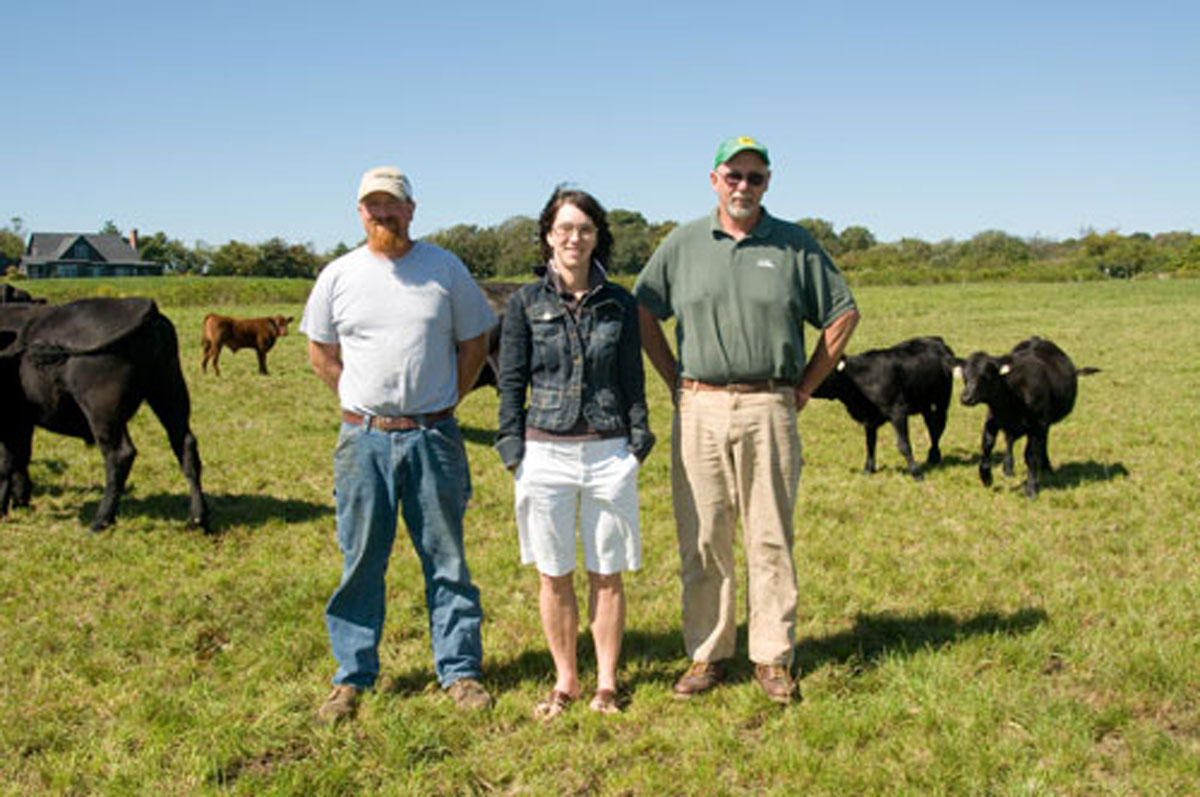Aquidneck Farms Grass-fed Cows Help Graze the Way to Sustainability
How do you preserve land from development and make it economically viable and environmentally sustainable while maintaining the interests of your family and peace with your neighbors—all in cooperation with your township and state regulatory bodies? Not easily!
Despite the obvious and the not-so-obvious hurdles, Barbara Van Beuren’s lofty goals have nearly been met for Aquidneck Farms in Portsmouth, Rhode Island, thanks to a herd of grass-guzzling Angus cows.
Beef cattle turned out to be the solution to the numerous challenges of finding a sustainable solution for land use. The added value is flavorful, 100% grass-fed, pasture raised beef available to Rhode Island eaters at the farm (on Fridays), at six summer and winter farmers’ markets and a number of farm-to-table restaurants around the state. In addition to the Angus herd, Aquidneck Farms operates a pastured poultry program, producing both eggs and broilers.
“We needed to find a way we could save the land, make it productive, all without making environmental sacrifices—that was extremely important,” said Van Beuren, an architect with a keen interest in land use.
The farm is set on a plateau above the Sakonnet River, where one field affords a stunning view of Little Compton while others are edged with lush woodland. Neighboring houses serve as easy reminders that Aquidneck Farms, despite its historic roots, is operating in a new era where suburban inhabitants and farm animals must peacefully co-exist.
With fields and pastures running almost contiguously over 320 acres (a mixture of Van Beuren’s property and leased parcels), part of the current farm dates back to the 1700s, originally called Vaucluse Farm. Van Beuren and her two siblings owned 270 acres of the farmland that had previously been used for dairy followed by show cattle and turf. In 1998 it was divided, then restricted for agricultural use by a conservation easement (cows were reintroduced in 2002). Van Beuren, who manages the finances, owns and oversees Aquidneck Farms, now leases some land from her siblings in a friendly arrangement, plus additional acreage from the town of Portsmouth and St. Mary’s Church.
Her herd of jet-black Angus cows spend most of their time chewing grass on 91 acres of pasture about a half mile down the road from the main farm buildings where Aquidneck Farms’ farm manager Jim Booth and livestock manager Mike Victor start their day. Booth oversees farm operations; Victor manages the herd; and Booth’s son, James, grows and hays some 200 acres to produce “haylage” (a fermented grass feed) they need to fuel the cows during the winter months when fresh grass is scarce.
“We want the farm to be self sustaining, both the feed and the herd itself. We need to process 50 cows a year—this year we’re on track for 45,” says Booth, who as been at the farm since 2001.
Another goal in their self-sustaining mission is to have a closed herd (no need to buy more cattle). “A big part of our success is in the genetics. We are still getting some of the Angus from Barbara’s cousin in Pennsylvania—they’ve got excellent characteristics for our needs [consistency, build and easy calving] and we know they’ve been raised well. It takes some years to build a closed herd but, at 175 cows and two bulls, we’re almost there,” Booth explains.
Mike Victor came to Aquidneck Farm in 2008 and was interested in managing a grass-based herd and facilitating direct market sales. “Those are the two key factors to sustainability,” he asserts. Selling directly to consumers through various markets makes a big difference in overall profitability. Aquidneck Farms sells directly to some area restaurants and through the Farm Fresh Rhode Island Market Mobile. Steady restaurant customers include the Beehive Café in Bristol, Castle Hill Inn & Resort in Newport and Temple at the Renaissance Hotel in Providence. (For a full list of buyers visit FarmFresh.org.)
Like so many Rhode Island livestock producers, processing for Aquidneck Farms takes place in Johnston and Westerly in an arrangement facilitated by the Rhode Island Raised Livestock Association. Cuts include New York strip, various roasts, ground beef and flat iron steak. They offer beef sausage and kielbasa along with stew beef and ribs that are perfect for braising. Van Beuren’s favorite? “Since I started doing this I began cooking things for my family I’d never tried before—like short ribs and pot roasts—long and slow cooking that many home cooks have gotten away from in favor of the primal cuts.”
Generally grass-fed beef cooks a bit faster, tastes somewhat stronger and is much leaner than grain-fed beef you find in grocery stores. It’s higher in omega-3s, vitamin E and Conjugated Linoleic Acid (CLA). The cows themselves are healthier since, as ruminants, they’re living on the diet they’re meant to eat.
Chefs’ feedback continues to be positive while Victor reports a number of vegetarian converts. Roaming the open pastures of Aquidneck Farms, the cows are doing their job to keep the land productive while providing us with flavorful and sustainable alternatives for the restaurant and home table.
Aquidneck Farms
333 Wapping Rd., Portsmouth, RI
401.849.0337
Visit www.AquidneckFarms.com or visit the farm store on Fridays.




